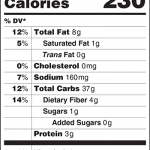Dr. Jonathan Schoenfeld of the Harvard School of Public Health has published a new study in the American Journal of Clinical Nutrition that says trials have failed to find effects for observational studies that link foods with cancer. Everything from low fat salad dressing to celery, olives, and sugar has been linked to cancer development in observational studies. The scientists chose 50 random ingredients from the Boston Cooking-School Cook Book then searched each ingredient to find associations with cancer risk in medical literature. They found that 40 foods, including flour, coffee, butter, sugar, peas, duck, tomatoes, lemons, onions, carrots, parsley, lobster, veal, cinnamon, and mustard, had been studied as being possible carcinogens. The ten that were not studied were uncommon … [Read more...]
FDA Helps Consumers Reduce Sodium Intake
The Food and Drug Administration wants to help American consumers reduce their sodium intake. On average, U.S. consumers eat about 3300 mg of sodium every day, a full 1000 mg above the 2010 Dietary Guidelines level of 2300 mg. That much sodium can cause development and escalation of high blood pressure, which is a leading cause of stroke, heart disease, and kidney disease. Anyone over the age of 51 should reduce their sodium level to just 1500 mg daily. The CDC has reported that children and adolescents consume this high level of sodium too, which doubles their risk of developing high blood pressure. Dr. Jessica Leighton, senior advisor for science in the FDA's Office of Food and Veterinary Medicine, said, "There has been a common misconception that sodium intake is just a concern for … [Read more...]
Vitamin D Deficiency May Lead to Higher Risk of Type 1 Diabetes
A new study published in Diabetologia has found that there is a correlation between low serum levels of vitamin D3 and development of Type 1 diabetes. A six year analysis of 2000 military service members from 2002 to 2008 found that higher levels of D3 are associated with a lower incidence of that disease. One thousand samples from healthy people who later developed the disease, and 1000 samples from healthy people who did not develop it were analyzed. Since there are about 40,000 new cases of type 1 diabetes diagnosed in the US every year, searches for a cause are ongoing. A EURO-DIAB case control study found that children who did not receive a vitamin D supplement while they were infants had 1.5 times the risk of type 1 diabetes disease development. The scientists found that "the … [Read more...]
New Study: Link Between Red Meat Consumption and Bladder Cander
A new study presented at the 11th AACR International Conference on Frontiers in Cancer Prevention Research found that protein and iron found in red meat, when combined in the body, form N-nitroso compounds that may increase the risk of bladder cancer. Furthermore, some people have a reduced ability to reverse the effects of those compounds because of a specific gene variation. Chelsea Catsburg of the University of Southern California said that, "nitrosamine formation occurs predominantly in the stomach and intestines, so these exposures have been studied extensively in relation to gastric cancer and somewhat in relation to colorectal cancer. However, there is evidence that these reactions also take place in the bladder, particularly in the presence of infection." Ms. Catsburg is a … [Read more...]
Tuna in School Lunches May Pose Danger to Children
The Mercury Policy Project has issued the first ever report on testing for mercury in tuna sold to the nation's schools. The report, titled "Tuna Surprise: Mercury in School Lunches", states that canned tuna is the largest source of methyl mercury in the U.S. diet and is a major source of mercury exposure for children." U.S. children eat twice as much tuna as they do of any fish or seafood. This high consumption rate, coupled with children's low body weights, can results in doses of mercury that exceed federal safety standards. No previous research has documented mercury levels in tuna served in schools. The Project bought 59 samples of canned tuna in 11 states around the country and tested them for mercury. The average mercury level in light tuna was 0.118 micrograms/gram, which was … [Read more...]
McDonald’s Posts Calorie Counts on Menu Boards
McDonald's is going to start posting calorie counts for all of its products on menu boards starting the week of September 16, 2012. The company is getting ahead of the curve on the Affordable Care Act regulation that requires national restaurants with 20 or more locations to post calorie counts. When the U.S. Supreme Court upheld the act in June 2012, McDonald's decided to act. The chain already posts calorie counts at its locations in California, Philadelphia, and New York city. Other fast food establishments do post calorie counts. Subway and Panera Bread Company have calorie counts on their menus. The regulation to post counts may go into effect early next year, which will force other chains such as Wendy's, Taco Bell, and Burger King to comply. McDonald's has had nutrition … [Read more...]
USDA Report on Household Food Security in 2011
The USDA has just released its Economic Research Service (ERS) report summary on food security for 2011. The report looks at the number of Americans who are "food secure". The USDA monitors these conditions through an annual, nationally representative survey. Most households, 85.1%, were food secure throughout the year, meaning that they have "consistent, dependable access to enough food for active, healthy living." In the remaining 14.9% of households, residents are food insecure. Members of those households have difficulty providing enough food for all members for lack of resources. The change from the 2010 report was not statistically significant. But the number of households in the severe range of food insecurity increased to 5.7% from 5.4%, which is a statistically significant … [Read more...]
Organic Foods Not Safer, More Nutritious than Conventionally Grown Foods
A new study conducted at Stanford Center for Health Policy and published in the Annals of Internal Medicine questions whether organically-grown foods are safer or more nutritious than conventionally produced foods. This systemic review, which extracts data from English-language studies, says no. Seventeen studies in human beings and 223 studies of nutrient and contaminant levels in foods were examined. There were no long-term studies of health outcomes among people eating organic versus conventionally raised foods. Three of the human studies researched clinical outcomes; those found no difference between populations who ate organic foods and those who ate conventional foods for allergic reactions or Campylobacter infections. Two of the human studies found significantly lower pesticide … [Read more...]
Healthy, Hunger-Free Kids Act of 2010 Changes School Lunch Meals
School starts again next week for many kids; lots of kids are already in school! While a new school year always brings changes, this year the school lunch is changing. In January 2012, one year after the Healthy, Hungry-Free Kids Act of 2010 was signed into law, the USDA issued their final, updated standards for school meals. The main purpose of the Act is to improve the nutrition of foods served at school to help kids achieve better nutrition and to reduce the skyrocketing childhood obesity rate. The core Child Nutrition Programs at the USDA, including the National School Lunch program, School Breakfast program, Child and Adult Care Food Program, WIC, and the Summer Food Service Programs, were reauthorized by the Act. The Act includes the first major changes to these programs in … [Read more...]
Butter Flavoring Linked to Alzheimer’s Disease
A new study published in Chemical Research in Toxicology showed that the butter flavoring diacetyl (DA) increases the type of protein clumping linked to Alzheimer's disease. The chemical is found in many processed foods, including microwave popcorn, snack foods, baked goods, and margarine. In fact, the researchers say that diacetyl is "ubiquitous" in the modern diet. The study's authors are troubled about chronic exposure that industry workers have to DA. That exposure may lead to long-term neurological damage. DA easily traversed the blood-brain barrier, which usually keeps substances from entering the brain itself. Scientists do not know if consuming DA in products like microwave popcorn can cause problematic levels of the chemical in the body. Diacetyl's structure is similar to … [Read more...]













